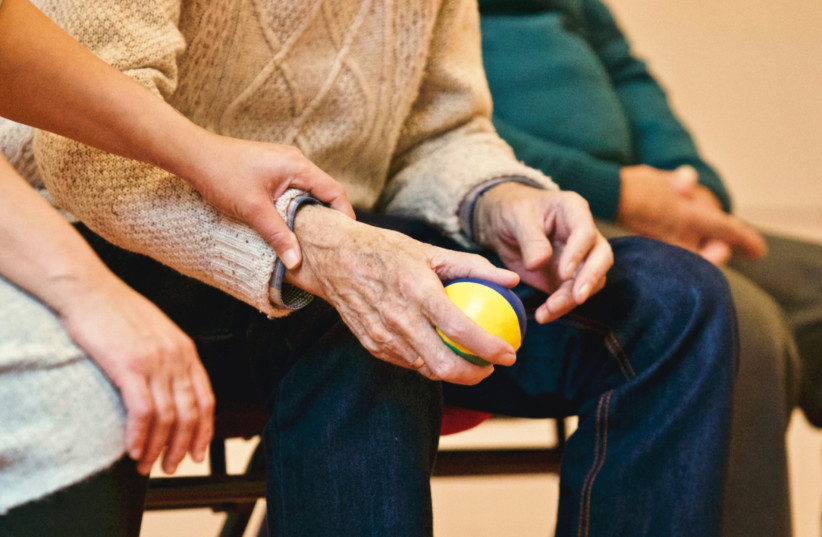Bruce Willis' heartbreaking situation brought awareness to the complex struggle of many families who see a loved one disappearing before their eyes. Family members of dementia and Alzheimer's patients face a terrible reality, one in which they find themselves at the center of intensive therapeutic activity 24 hours a day.
Caring for a relative suffering from dementia often causes the entire family to change the course of their lives, when the therapeutic burden is mostly carried on the shoulders of close family members.
Alzheimer's disease often changes the personality and behavior of our loved ones. Although it's difficult and harsh at times, our behavior towards them should be understanding and inclusive. Being compassionate and sensitive will also help the person we're treating, and will change to some extent our feelings towards them.
Here are eleven tools that will help you in this complex struggle:
Try not to react critically
People with dementia are neither crazy nor lazy. They say and do normal things for dementia patients. If they did or said things with the intention of annoying you, their diagnosis would be different.

Some things can't be changed
The reality of dementia patients is now different from yours, and you can't change or even conquer the disease. You can only control your reaction to it.
Their "disability" is memory loss
They can't remember, and they forget that they can't remember. They will ask the same question over and over, believing it's the first time they're asking.
They don't hide things, they protect things by hiding them in a safe place
Sometimes it's from anxiety or boredom; other times there's a vague memory which gives a sense of loss, memories of the distant past. Don't take accusations of theft personally. Look around and see where the person hides belongings. When you can find things easily this will prevent panic attacks and false accusations.
They are afraid
People with dementia experience many losses as the disease develops. We all feel anxious when something is lost and we can't find it over time. This is the daily experience of dementia patients.
They're anxious most of the time and each patient expresses anxiety differently. Some may be passive, uncooperative, hostile, angry, agitated, swearing or physically violent. They may even combine all of these behaviors at different times. Anxiety may compel them to follow you everywhere. Ask your doctor for medication which will reduce anxiety and calm them.
Give your full attention
When you try to talk to a person with dementia, neutralize surrounding noises. Turn off the TV and radio, close the door, etc. Before you start talking, call the person's name, remind them who you are, even if they're close family. Sit or stand so that the patient can see you easily and not behind his back, and maintain eye contact.
They don't make up stories; they experience reality in a different and sometimes threatening way.
Don't react by dismissing their feelings, don't correct them with anger even if what they say sounds strange and even absurd to you. Respond by trying to understand what's bothering them, and answer with empathy; calm and distract them.
For example: A person who expresses anxiety that someone is trying to steal money needs empathy and protection. It's completely understandable how unpleasant and even scary it is when someone tries to steal from you. Be reassuring by saying this won't happen and distract the person by offering some activity, for example asking for help with light kitchen work.
How do you prevent an aggressive response?
Don't convince, argue, confront, or criticize. Don't remind people with dementia that they forget, and don't ask questions about the last days since short-term memory is already damaged in the initial stages of the disease, and along with it the ability to concentrate and learn.
We can't educate a person suffering from dementia, we can only go with the flow.
Put yourself in their place for a moment
Try to hear through their ears, see through their eyes and feel through the heart. Try to understand what they tried and failed to say. If they get confused, help them find the words, offer options for an answer, have an empathetic and inclusive conversation to help them relax and continue the conversation.
Don't lose your sense of humor
Try to treat the situation with humor, even make fun of yourself. Remind the person of a funny incident from the past, tell a good joke and laugh together. Laughter releases endorphins, the natural happiness hormones in the body.
Get help
Day centers for those with memory loss operate throughout the country. Check if there's one near you.
People with dementia will receive treatment for about five hours/day which will ease your family's burden. A day center for the elderly is a community service intended for adults living at home and interested in joining a community-social framework that provides a variety of services.
Those entitled to nursing benefits from the National Insurance Institute can exchange their eligibility to receive home nursing care for the day centers. Elderly people at the centers spend the day doing various planned activities suitable for their age and health condition. They can enjoy company, be cared for and eat a hot lunch.
Vicky Nenei is a social worker specializing in dementia for the Matav association.
